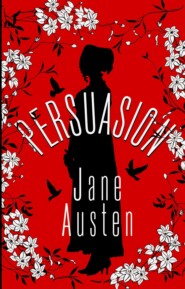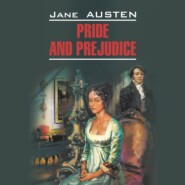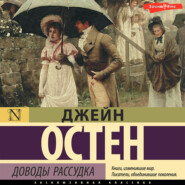По всем вопросам обращайтесь на: info@litportal.ru
(©) 2003-2025.
✖
Pride and Prejudice / Гордость и предубеждение
Настройки чтения
Размер шрифта
Высота строк
Поля
“You write uncommonly fast.”
“You are mistaken. I write rather slowly.”
“Please tell your sister that I want to see her.”
“I have already told her, by your desire.”
“I am afraid you do not like your pen. Let me mend it for you. I mend pens remarkably well.”
“Thank you – but I always mend myself.”
“Tell your sister I am delighted to hear her playing the harp. Do you always write such charming long letters to her, Mr. Darcy?”
“They are generally long; but whether always charming it is not for me to determine.”
“It is a rule with me, that a person who can write a long letter with ease, cannot write badly.”
“My style of writing is very different from yours. And what do you think, dear Elizabeth?”
“I think,” said Elizabeth, “Mr. Darcy must finish his letter.”
Mr. Darcy took her advice, and did finish his letter.
When that business was over, he offered young ladies to play some music.
Mrs. Hurst sang with her sister, and while they were thus employed, Elizabeth noticed, how frequently Mr. Darcy’s eyes were fixed on her. She hardly knew how to suppose that she could be an object of admiration to such a great man; and yet that he should look at her because he disliked her, was still more strange. She could only imagine, however, at last that she drew his attention because there was something wrong with her, according to his ideas of right, than in any other person present.
After playing some Italian songs, Mr. Darcy, coming to Elizabeth, said to her:
“Do not you feel like dancing, Miss Bennet?”
She smiled, but made no answer. He repeated the question, with some surprise at her silence.
“Oh!” said she, “I heard you before, but I could not immediately decide what to say in reply. You wanted me, I know, to say ‘Yes,’ that you might have the pleasure of despising my taste. But I say ‘no’, I do not want to dance at all-and now despise me if you dare.”
“Indeed I do not dare.”
Elizabeth was amazed at his gallantry; but there was a mixture of sweetness. Darcy had never been so bewitched by any woman as he was by her.
Miss Bingley saw, or suspected enough to be jealous; and her great anxiety for the recovery of her dear friend Jane was sincere.
Chapter 11
When the ladies removed after dinner, Elizabeth ran up to her sister, and seeing her well attended her into the drawing-room, where she was welcomed by her two friends with pleasure. And Elizabeth had never seen them so agreeable as they were during the hour which passed before the gentlemen appeared. They could describe an entertainment with accuracy, relate an anecdote with humour, and laugh at their acquaintance with spirit.
But when the gentlemen entered, Jane was no longer the first object; Miss Bingley’s eyes were instantly turned toward Darcy. He addressed himself to Miss Bennet, with a polite congratulation. Elizabeth, in the opposite corner, saw it all with great delight.
When tea was over, Mr. Hurst reminded his sister-in-law of the card-table – but in vain. Mr. Darcy did not want to play cards. Mr. Hurst had therefore nothing to do, but to stretch himself on one of the sofas and go to sleep. Darcy took up a book; Miss Bingley did the same.
Miss Bingley yawned and said, “How pleasant it is to spend an evening in this way! I declare after all there is no enjoyment like reading! When I have a house of my own, I shall be miserable if I have not an excellent library.”
No one made any reply. She then yawned again, threw aside her book. Her brother was talking to Miss Bennet about the ball, so she turned suddenly towards him and said:
“Charles, are you really serious about a dance at Netherfield? I think there is somebody among us to whom a ball would be rather a punishment than a pleasure.”
“If you mean Darcy,” cried her brother, “he may go to bed, if he chooses, before it begins – but as for the ball, it is quite a settled thing.”
“I should like balls infinitely better,” she replied, “if they were carried on in a different manner.” Turning to Elizabeth, she said:
“Miss Eliza Bennet, let me persuade you to follow my example, and take a turn about the room.”
Elizabeth was surprised, but agreed to it immediately. Mr. Darcy looked up. He was invited to join their party, but he declined it.
“You have secret affairs to discuss,” said he, “or you know well that your figures appear better in walking. If the first, I would stand in your way, and if the second, I can admire you much better as I sit by the fire.”
“Oh! shocking!” cried Miss Bingley. “I never heard anything so abominable. How shall we punish him for such a speech?”
“Nothing so easy,” said Elizabeth. “Tease him – laugh at him.”
“But tease calmness of manner and presence of mind! No, no.”
“Mr. Darcy is not to be laughed at!” cried Elizabeth. “I dearly love a laugh.”
“Miss Bingley,” said he, “has given me more credit than can be. The wisest and the best of men may be rendered ridiculous by a person whose first object in life is a joke.”
“Certainly,” replied Elizabeth – “there are such people, but I hope I am not one of them. I hope I never ridicule what is wise and good. Follies and nonsense, whims and inconsistencies, do divert me, and I laugh at them whenever I can. Such as vanity and pride.”
“Yes, vanity is a weakness indeed. But pride – where there is a real superiority of mind, pride will be always under good regulation.”
Elizabeth turned away to hide a smile.
“Your examination of Mr. Darcy is over, I presume,” said Miss Bingley; “and what is the result?”
“I am perfectly convinced by it that Mr. Darcy has no defect.”
“No,” said Darcy, “I have faults enough, but they are not, I hope, of understanding. My temper would perhaps be called resentful. My good opinion once lost, is lost forever.”
“That is a failing indeed!” cried Elizabeth.
“Do let us have a little music,” cried Miss Bingley, tired of a conversation in which she had no share.
The pianoforte was opened; and Darcy was not sorry for it. He began to feel the danger of paying Elizabeth too much attention.
Chapter 12
In consequence of an agreement between the sisters, Elizabeth wrote the next morning to their mother, to beg that the carriage might be sent for them in the course of the day. But Mrs. Bennet calculated on her daughters remaining at Netherfield till the following Tuesday. She told them that they could not possibly have the carriage before Tuesday; and in her postscript it was added, that if Mr. Bingley and his sister pressed them to stay longer, she could spare them very well.
Miss Bingley was very sorry that she had proposed the delay, for her jealousy and dislike of one sister much exceeded her affection for the other.
“You are mistaken. I write rather slowly.”
“Please tell your sister that I want to see her.”
“I have already told her, by your desire.”
“I am afraid you do not like your pen. Let me mend it for you. I mend pens remarkably well.”
“Thank you – but I always mend myself.”
“Tell your sister I am delighted to hear her playing the harp. Do you always write such charming long letters to her, Mr. Darcy?”
“They are generally long; but whether always charming it is not for me to determine.”
“It is a rule with me, that a person who can write a long letter with ease, cannot write badly.”
“My style of writing is very different from yours. And what do you think, dear Elizabeth?”
“I think,” said Elizabeth, “Mr. Darcy must finish his letter.”
Mr. Darcy took her advice, and did finish his letter.
When that business was over, he offered young ladies to play some music.
Mrs. Hurst sang with her sister, and while they were thus employed, Elizabeth noticed, how frequently Mr. Darcy’s eyes were fixed on her. She hardly knew how to suppose that she could be an object of admiration to such a great man; and yet that he should look at her because he disliked her, was still more strange. She could only imagine, however, at last that she drew his attention because there was something wrong with her, according to his ideas of right, than in any other person present.
After playing some Italian songs, Mr. Darcy, coming to Elizabeth, said to her:
“Do not you feel like dancing, Miss Bennet?”
She smiled, but made no answer. He repeated the question, with some surprise at her silence.
“Oh!” said she, “I heard you before, but I could not immediately decide what to say in reply. You wanted me, I know, to say ‘Yes,’ that you might have the pleasure of despising my taste. But I say ‘no’, I do not want to dance at all-and now despise me if you dare.”
“Indeed I do not dare.”
Elizabeth was amazed at his gallantry; but there was a mixture of sweetness. Darcy had never been so bewitched by any woman as he was by her.
Miss Bingley saw, or suspected enough to be jealous; and her great anxiety for the recovery of her dear friend Jane was sincere.
Chapter 11
When the ladies removed after dinner, Elizabeth ran up to her sister, and seeing her well attended her into the drawing-room, where she was welcomed by her two friends with pleasure. And Elizabeth had never seen them so agreeable as they were during the hour which passed before the gentlemen appeared. They could describe an entertainment with accuracy, relate an anecdote with humour, and laugh at their acquaintance with spirit.
But when the gentlemen entered, Jane was no longer the first object; Miss Bingley’s eyes were instantly turned toward Darcy. He addressed himself to Miss Bennet, with a polite congratulation. Elizabeth, in the opposite corner, saw it all with great delight.
When tea was over, Mr. Hurst reminded his sister-in-law of the card-table – but in vain. Mr. Darcy did not want to play cards. Mr. Hurst had therefore nothing to do, but to stretch himself on one of the sofas and go to sleep. Darcy took up a book; Miss Bingley did the same.
Miss Bingley yawned and said, “How pleasant it is to spend an evening in this way! I declare after all there is no enjoyment like reading! When I have a house of my own, I shall be miserable if I have not an excellent library.”
No one made any reply. She then yawned again, threw aside her book. Her brother was talking to Miss Bennet about the ball, so she turned suddenly towards him and said:
“Charles, are you really serious about a dance at Netherfield? I think there is somebody among us to whom a ball would be rather a punishment than a pleasure.”
“If you mean Darcy,” cried her brother, “he may go to bed, if he chooses, before it begins – but as for the ball, it is quite a settled thing.”
“I should like balls infinitely better,” she replied, “if they were carried on in a different manner.” Turning to Elizabeth, she said:
“Miss Eliza Bennet, let me persuade you to follow my example, and take a turn about the room.”
Elizabeth was surprised, but agreed to it immediately. Mr. Darcy looked up. He was invited to join their party, but he declined it.
“You have secret affairs to discuss,” said he, “or you know well that your figures appear better in walking. If the first, I would stand in your way, and if the second, I can admire you much better as I sit by the fire.”
“Oh! shocking!” cried Miss Bingley. “I never heard anything so abominable. How shall we punish him for such a speech?”
“Nothing so easy,” said Elizabeth. “Tease him – laugh at him.”
“But tease calmness of manner and presence of mind! No, no.”
“Mr. Darcy is not to be laughed at!” cried Elizabeth. “I dearly love a laugh.”
“Miss Bingley,” said he, “has given me more credit than can be. The wisest and the best of men may be rendered ridiculous by a person whose first object in life is a joke.”
“Certainly,” replied Elizabeth – “there are such people, but I hope I am not one of them. I hope I never ridicule what is wise and good. Follies and nonsense, whims and inconsistencies, do divert me, and I laugh at them whenever I can. Such as vanity and pride.”
“Yes, vanity is a weakness indeed. But pride – where there is a real superiority of mind, pride will be always under good regulation.”
Elizabeth turned away to hide a smile.
“Your examination of Mr. Darcy is over, I presume,” said Miss Bingley; “and what is the result?”
“I am perfectly convinced by it that Mr. Darcy has no defect.”
“No,” said Darcy, “I have faults enough, but they are not, I hope, of understanding. My temper would perhaps be called resentful. My good opinion once lost, is lost forever.”
“That is a failing indeed!” cried Elizabeth.
“Do let us have a little music,” cried Miss Bingley, tired of a conversation in which she had no share.
The pianoforte was opened; and Darcy was not sorry for it. He began to feel the danger of paying Elizabeth too much attention.
Chapter 12
In consequence of an agreement between the sisters, Elizabeth wrote the next morning to their mother, to beg that the carriage might be sent for them in the course of the day. But Mrs. Bennet calculated on her daughters remaining at Netherfield till the following Tuesday. She told them that they could not possibly have the carriage before Tuesday; and in her postscript it was added, that if Mr. Bingley and his sister pressed them to stay longer, she could spare them very well.
Miss Bingley was very sorry that she had proposed the delay, for her jealousy and dislike of one sister much exceeded her affection for the other.

















